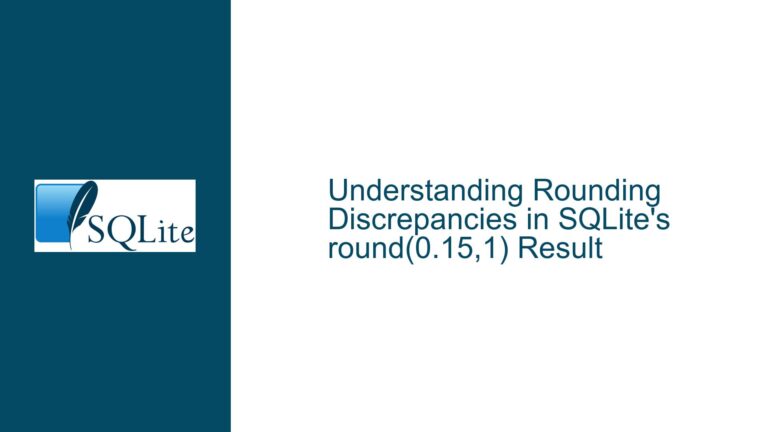SQLite REGEXP Operator: Handling Anchors and Parentheses in Pattern Matching
Issue Overview: REGEXP Operator Fails with Specific Patterns Involving Anchors and Parentheses
The core issue revolves around the behavior of the SQLite REGEXP operator when used with specific regular expression patterns that include anchors (^ and $) and parentheses. The problem manifests in two distinct ways:
First, the REGEXP operator fails to match patterns when the ^ anchor is used inside parentheses, even though the pattern is logically correct. For example, the query SELECT 1 WHERE 'foo' REGEXP '(^[a-z]+$)' returns no results, despite the string ‘foo’ matching the pattern ^[a-z]+$. This behavior is unexpected because the pattern should match any string that consists entirely of lowercase letters from start to finish.
Second, the REGEXP operator throws a runtime error when the $ anchor is used inside parentheses in certain configurations. Specifically, the query SELECT 1 WHERE 'foo' REGEXP '(^[a-z]+$)' results in a "Runtime error: unmatched ‘(‘" error. This error suggests that the SQLite REGEXP implementation is not correctly parsing or interpreting the parentheses in conjunction with the $ anchor.
These issues are particularly problematic for users who rely on the REGEXP operator for complex pattern matching, as they limit the ability to use certain valid regular expression constructs. The problem is exacerbated by the fact that the behavior is inconsistent: some patterns work as expected, while others fail or produce errors.
Possible Causes: Parsing and Interpretation of Anchors and Parentheses in REGEXP
The root cause of these issues lies in the way SQLite’s REGEXP operator parses and interprets regular expression patterns, particularly when anchors and parentheses are involved. SQLite’s REGEXP implementation is not native to the core SQLite library but is typically provided via an extension, such as regexp.c. This extension relies on an underlying regular expression engine, which may have limitations or bugs in handling certain pattern constructs.
One possible cause is that the REGEXP extension does not correctly handle nested or grouped anchors. In regular expressions, anchors like ^ and $ are used to match the start and end of a string, respectively. When these anchors are placed inside parentheses, they should still function as intended, but the REGEXP extension may be misinterpreting their scope or position. This could lead to the pattern failing to match even when it logically should.
Another possible cause is a parsing error in the REGEXP extension when encountering parentheses. The runtime error "unmatched ‘(‘" suggests that the extension is not correctly identifying the closing parenthesis or is misinterpreting the structure of the pattern. This could be due to a bug in the parsing logic or an incompatibility with the underlying regular expression engine.
Additionally, the behavior may be influenced by the version of the REGEXP extension being used. The discussion mentions that the latest version of ext/misc/regexp.c fixes the issue with the $ anchor but not the ^ anchor. This indicates that the problem is partially resolved in newer versions, but some issues persist. Users who are not using the latest version of the extension may encounter both the ^ and $ anchor issues.
Troubleshooting Steps, Solutions & Fixes: Addressing REGEXP Pattern Matching Issues
To address the issues with the REGEXP operator, users can take several troubleshooting steps and apply potential fixes. These steps range from verifying the REGEXP extension version to modifying the regular expression patterns to avoid problematic constructs.
Step 1: Verify the REGEXP Extension Version
The first step is to ensure that the latest version of the REGEXP extension is being used. The discussion mentions that the latest version of ext/misc/regexp.c fixes the issue with the $ anchor but not the ^ anchor. Users should check the version of the REGEXP extension they are using and update it if necessary. This can be done by downloading the latest version of the SQLite source code and compiling the regexp.c extension.
Step 2: Modify Regular Expression Patterns
If updating the REGEXP extension is not feasible or does not resolve the issue, users can modify their regular expression patterns to avoid the problematic constructs. For example, instead of using (^[a-z]+$), users can rewrite the pattern as ^[a-z]+$ without the parentheses. This avoids the issue with nested anchors and parentheses while still achieving the same logical match.
Step 3: Use Alternative Pattern Matching Techniques
If the REGEXP operator continues to exhibit issues, users can consider using alternative pattern matching techniques. SQLite provides several built-in functions for string matching, such as LIKE and GLOB, which can be used for simpler patterns. For more complex patterns, users can implement custom pattern matching logic using SQLite’s CASE statements or user-defined functions.
Step 4: Debug the REGEXP Extension
For advanced users, debugging the REGEXP extension may be an option. This involves examining the source code of the regexp.c extension to identify the root cause of the parsing and interpretation issues. Users can add logging or debugging statements to the code to trace how the patterns are being processed and identify where the errors occur. This approach requires a good understanding of C programming and the SQLite extension API.
Step 5: Report the Issue to the SQLite Development Team
If the issue persists and cannot be resolved through the above steps, users should consider reporting the issue to the SQLite development team. Providing a detailed description of the problem, along with reproducible test cases, can help the developers identify and fix the issue in future releases. The SQLite forum and issue tracker are good platforms for submitting bug reports and engaging with the development community.
Step 6: Implement a Custom REGEXP Function
As a last resort, users can implement a custom REGEXP function using SQLite’s ability to load external libraries or define user-defined functions in a programming language like Python or C. This allows users to bypass the limitations of the built-in REGEXP operator and implement their own regular expression logic. However, this approach requires significant effort and expertise.
By following these troubleshooting steps and applying the appropriate fixes, users can work around the limitations of the SQLite REGEXP operator and achieve reliable pattern matching in their queries. While the issues with anchors and parentheses are frustrating, they are not insurmountable, and with the right approach, users can continue to leverage the power of regular expressions in SQLite.






